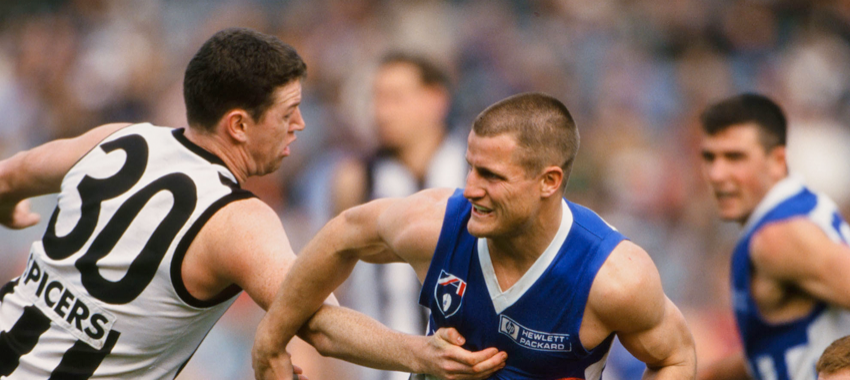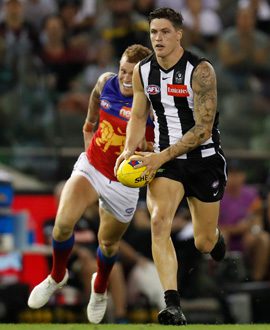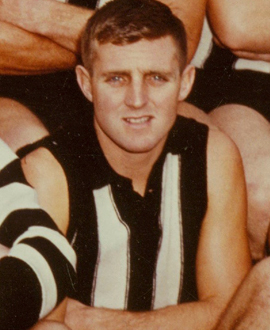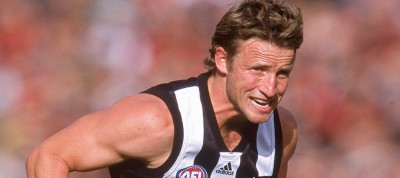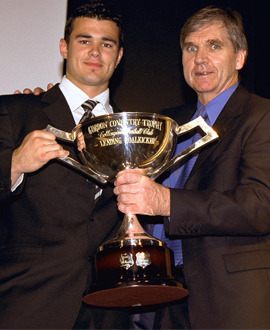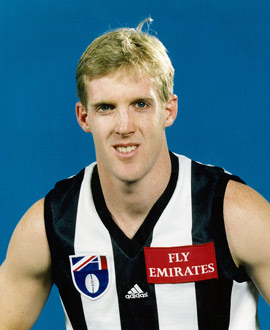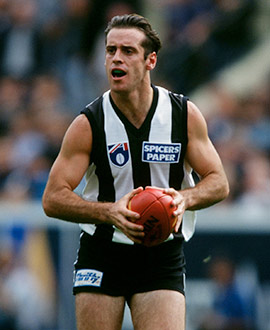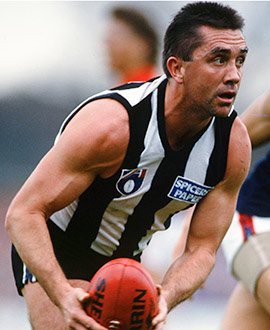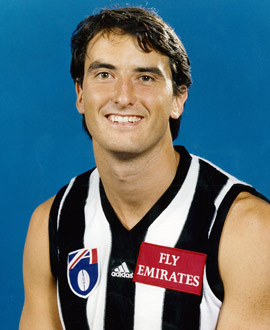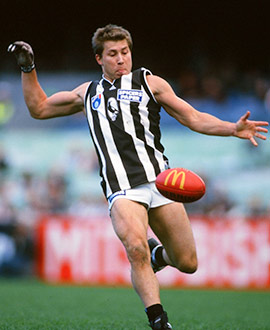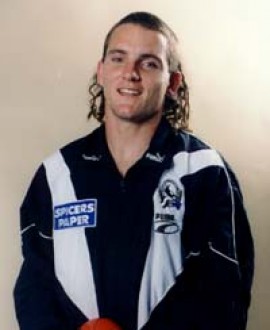By: Glenn McFarlane
Where were you when you heard the news that Princess Diana had died?
Without wanting to sound parochial for an event that truly rocked the world, and would become the next generation's JFK moment, for many Collingwood supporters, they can tell you precisely where they were when they found out the news.
They were at the MCG for a final round match against North Melbourne in a year.
It was August 31, 1997 and what started out as a casual Sunday in which the Magpies were about to farewell a season that had been solid - but not good enough - ended up being a date no one would ever forget.
The events of that afternoon - like the moment when two hijacked planes were flown into the World Trade Centre in New York four years and 11 days after Diana's death – will forever be etched in the memories of those who lived through it, no matter where they were.
For those of us who happened to be at the MCG, the eerie feeling that swept the stadium when the news filtered through was unusual and unsettling.
Twenty-five-year-old Nathan Buckley was on his way to the MCG when he heard the news of an accident involving the Princess of Wales and her boyfriend Dodi Al Fayed in a Mercedes in a tunnel on the Place De l'Alma in Paris. The information was initially sketchy, with reports saying that Dodi was dead and that Diana was in a serious condition.
The accident had happened at 12.30am Paris time, which was 8.30am Sunday morning Melbourne time. By noon Diana had been pronounced dead, and it was released publicly just before 2pm.
Buckley was in his game-face mode by that stage and would not find out about the Princess' passing until the end of the Kangaroos match. There was a match to win.
Collingwood supporters at the game, and hundreds of millions throughout the world, did not have to wait as long for the horrible news.
One Magpie supporter in the crowd of 43,660 fans later explained how she had heard a person near her mention that Diana had been in an accident, but had survived with only a gash on her leg.
A few minutes later the same woman cried out: "She's dead."
The fan recalled: "I thought if it was true, there would be some sort of announcement. Sure enough, about five minutes later an announcement on the screen said: 'The French government has just announced that Diana, Princess of Wales, has died this morning as a result of a car crash in a Paris tunnel.'
"I will never forget it. It spread like wildfire around the 'G. All you could hear was the murmouring of people taking it in. Such a sad thing to happen."
Eddie McGuire was still more than a year away from becoming Collingwood president, but the media personality knew as soon as he heard the news that this day was remarkable.
That night he concluded: "It will be one of those days like when John F. Kennedy was killed and man walked on the moon. People will always remember where they were ..."
As far as the football went, Collingwood's season was as good as over. The game against North Melbourne was to be the club's last match, as the Magpies had been knocked out of finals contention the previous Monday with a loss to Adelaide. But coach Tony Shaw, closing out his second season in the role, spoke pre-game about the importance of making a statement for the future.
It would be no pushover as the Kangaroos boasted the stars that had won the club's third flag less than 12 months earlier. Yet there was hope as Pies fans recalled how Shaw's young men had beaten Denis Pagan's side by 43 points in the Round 7 clash.
That win had elevated Collingwood to equal top. But it would prove to be a false dawn. A win would come against the Western Bulldogs the following week, but from there the season spiralled out of control, with a six-week run of losses cutting deeply into any hope of a finals appearance.
The narrow loss to the Crows in the penultimate round meant that finals were out of the picture. Pride was the only thing on offer against the Kangaroos in the last game.
There were a couple of surprises early, with the main one coming with Shaw's decision to start Anthony Rocca at centre half-back. The coach would later explain: "With 'Monky' (Damian Monkhorst) out and Matty Francis in the ruck, we had to play somebody on Corey (McKernan) or whatever tall that was down there. It was just a case of ‘have to’ really."
The Collingwood side was comparatively young compared to their opponents, with the Kangaroos on average two years older with more than 900 games more experience.
The Pies included eight players who had 100 or more AFL games of experiences, including Gavin Brown (204), Gavin Crosisca (202), Richard Osborne (269 - 15th for Collingwood) and Scott Russell (167th).
The Roos had 12, including John Blakey (246), Robert Scott (203), Mick Martyn (198 on his 29th birthday) Wayne Schwass (183), Mark Roberts (183), Brett Allison (196) and the most dynamic forward in the game at that stage, Wayne Carey (159).
Shaw named 20-year-old Dwayne Griffin - 89th pick in the previous year's draft - and it is a fair bet to suggest he won't forget the day Diana died.
Griffin did not have a possession in what would prove to be his one and only game with Collingwood. The kid who would wear the No.32 that day without touching the ball would go on to play more than 100 games with Swan Districts, winning the club's best and fairest award in 2002.
North Melbourne looked to have the edge early in the game, claiming the early advantage before a determined Collingwood fought back to level the scores at quarter-time.
It was a 12-goal first term, with each team nailing six. But in the second term the Magpies got on top for a period and edged out to what would be the biggest margin of a close and tense encounter - 17 points.
By half-time the difference was eight points in Collingwood's favour, having kicked 5.2 to 4.6 for the second term.
Four of the Magpies' 11 goals at the main interval came from Saverio Rocca, who wouldn't manage another for the rest of the game.
A change came over the contest early in the third term and Carey had as much to do with it as anyone else.
Kangaroos coach Denis Pagan moved Carey out to centre half-forward, while shifting Corey McKernan - in his first game back from three weeks out – down back.
It made an immediate difference with Carey breaking clear of Aaron James (in only his 23rd game) to score a critical goal, while the Roos skipper also crashed into Collingwood's stand-in ruckman Matthew Francis.
Francis left the field on a stretcher and in a neck brace, further stretching Collingwood’s resources.
Thanks largely to Carey, the Kangaroos had clawed back the lead and took a one-point advantage into the final term.
The injury to Francis made for some rejigs to the Pies' line-up with Anthony Rocca finally going forward and making an impression with two of the club's four goals in the final term.
The Roos were in front at the start of time-on and it looked as if the team that was bound for the finals would prevail. But the Magpies were not done with yet.
First, Anthony Rocca produced a memorable snap, then John Barnett gave Collingwood some breathing space against his former side with a fine goal.
It would be one of only kicks that Barnett would have in the match, but it was a crucial one.
There were nine lead changes in the game, and it appeared as if there could be one more in the dying minutes. The Kangaroos cut the difference back to only five points when Brett Chandler snapped a goal with 95 seconds remaining. The game was right in the balance.
The Herald Sun summed up one of the last - and the most important - plays of the match: "In the end, it was the heroics of the best man afield that decided the issue."
That man was Paul Williams. In his sixth individual centre break of the game, he gathered the ball from the middle, baulked once, threw the ball down for a bounce and then turned on the after-burners with his trademark pace. He steadied, composed himself and slammed home the match-sealing goal from almost 50m in a way that "only champions can do."
Williams, 24, had put the game beyond doubt, with his third goal, from his 27th touch in what was his 135th game.
He might have been adjudged best afield in both leading newspapers, but when the men in white chose Stephen Patterson for three votes. Williams would receive the two votes, with Andrew Schauble polling one.
Buckley had 20 touches, Crosisca had 26, while 20-year-old Chad Liddell kicked two goals and 19-year-old Josh Mahoney did the same.
As pleased as he was by the 11-point win, Shaw was frustrated by the fact Collingwood had missed the finals for a third straight year.
After the game, Shaw said: "It's a bit hard to take because if we had won last week (against Adelaide), and I think we deserved to, then we could have been playing in the finals.
"We were pretty confident going into today because we do match up well with them.
"I've got no doubt there's no one there (in the finals) who can't be beaten (by us). It's great to have a win like that in the last game. But we can't get caught up with what happened last year when we had two good wins at the end of the season, but missed the finals.
"We started off (1997) well, but we've got to get better."
Pagan was furious with North's inaccurate 15.21 (111) to Collingwood's 18.14 (122).
"Our kicking and decision-making was atrocious,” he said.
"We had our chances and can make all the excuses in the world ... (But) to not win the game was criminal."
This would prove to be Collingwood's best season in four years under Shaw's coaching, winning 10 games and finishing 10th (missing out by only half a game).
But as Magpie fans walked out of the MCG last night, football was probably the last thing on many of their minds. It didn’t matter if you were Republican, or a Monarchist, or somewhere in between, the fact remained that footy just didn’t seem as important as what had occurred half a way away in Paris.
As Buckley said later: "I found it pretty humbling ... with someone of that stature dying, you realise life is pretty tenuous and doesn't wait for anyone."
And the tragedy was not just that the world had lost a person whom the UK Prime Minister Tony Blair called "the People's Princess", it was that two young men – William, 15, and Harry, 12, - had lost their mother.


